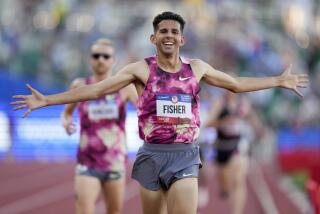Spitz Comeback Would Be Even Tougher : Swimming: He won seven golds in 1972 Olympics, but some doubt he can even make the ’92 team in the butterfly.
- Share via
As each stroke drew him closer to the end wall in the freestyle leg of the 400-meter medley relay, the last of his seven attempts to win Olympic gold, Mark Spitz wasn’t thinking about his place in history. His one desire was to get out of the water, literally and figuratively.
Spitz silenced the critics of his 1968 Olympic performance, in which he failed to win a gold medal in an individual event, by winning seven gold medals in seven races, each in world-record time, at the 1972 Munich Olympics.
Having proven himself as arguably the greatest swimmer of all time, Spitz saw no reason to continue. There was money to be lost by continuing and money to be made by retiring.
So Spitz quit at his peak, leaving behind the enduring image of a handsome, tan and trim hero in a red, white and blue suit, seven gold medals hanging from his neck.
Now, 19 years later, Spitz is not as lean, but he only looks a little fleshy because the young men around him have washboard stomachs.
In his comfort zone, the men’s gym pool at UCLA, Spitz, 41, can become one of these Bruins, undetected in the line of bodies, stroking face down in what Spitz hopes is a fountain of youth.
Spitz is back in his element, preparing for a challenge nearly as daunting as winning seven of seven. His new goal is to become the oldest medalist in Olympic swimming history, surpassing Duke Kahanamoku, a silver medalist at 33.
It is a three-step process. First, Spitz must qualify for the U.S. Olympic trials, which will be held next March, with a time of 55.59 seconds or better in the 100-meter butterfly, the only event for which he is training.
Then, he must be among the fastest eight swimmers in the trials preliminaries to qualify for the trials final.
Finally, he must finish first or second in the final to make the U.S. team.
Altogether, it’s an awesome task, considering that in some events the U.S. trials are more competitive than the Olympic Games themselves.
According to Spitz’s coach, UCLA’s Ron Ballatore, qualifying for the trials alone would be a remarkable feat.
“Everything he does past that is gravy,” Ballatore said. “(But) he doesn’t look at it that way. He sees himself in the finals (of the trials), which makes me say, ‘Look out!’ because then you have the intimidation factor. But first things first. He has to make the cut (qualifying time).”
Spitz has already made one cut, in the fall of 1989.
“When I first saw him, it looked like a hell of a long way to go,” Ballatore said. “He just looked like a kind of flabby 40-year-old.”
And when Spitz ruptured a disk in late November of that year, Ballatore figured the comeback was over.
But on Feb. 5, 1990, Spitz returned with a vengeance.
“I was leery,” Ballatore said. “And then he came back all fired up to do it.”
According to Spitz, though, the back injury and the effects of 17 years without training were not as difficult to overcome as his state of mind.
“The hardest thing was pushing myself, getting the will to train,” Spitz said. “In the beginning, I pushed myself at 50% for 50% of the time, but I needed to be doing it at 90% for 100% of the time.
“I never used to second-guess that I hadn’t trained enough, but I am second-guessing now. Not that I wasn’t given the opportunity, but that I didn’t use all of it. I have blind faith. I don’t look at the real task because if I really looked at what I had to do, I wouldn’t come to practice.”
In his heyday, Spitz was a big dropper, that is, a swimmer who drops time, swims much faster in meets than in practice. It is something he may not be able to count on this time around.
“We don’t know if a 41-year-old can make a drop,” Spitz said. “I might jump in the water and swim as fast as I did in practice.”
Spitz’s wariness stems from a series of impromptu 50-yard freestyle races he swam against Olympian Rowdy Gaines in 1984. With no dive, Spitz beat Gaines, covering the distance in 21 seconds, a tribute to his raw speed and the impetus for his return to swimming. But he has yet to go that fast in the 13 months since his back injury.
“It is frustrating, waiting and waiting,” said Spitz, who blames his inability to repeat that speed on weariness from training, particularly weight training, which was not part of his regimen in 1972.
Although he is down 10 pounds to 178, Spitz originally bulked up to 195 because of his work with weights.
“With weight training, and concentrating on one event rather than seven, theoretically it is easier,” Spitz said. “But I have to say that swimming at 41 is a lot different than 20.”
With few exceptions, economics, not age, drives swimmers out of the sport in their early 20s. No one knows whether they can compete at 37, as does Boston Celtic center Robert Parrish, or at 44, as does Texas Ranger pitcher Nolan Ryan.
But if Ballatore had to pick an aging ex-swimmer to test the waters, it would be Spitz, simply because he is so talented.
“He has tremendous feel for the water and great body position,” Ballatore said. “He tested better than any swimmer (the U.S. team has) ever had on stroke efficiency. Sometimes a swimmer’s fingers will spread so there’s a little opening for air bubbles, but Spitz has no air bubbles, he pulls nothing but water.
“His knees are hyper-extended so that he kicks in such a way that everything he does propels him forward. It is hard to explain. He’s like an artist in the water. Many people can copy his stroke, but it doesn’t mean it is going to work for them.”
Just as important to Spitz is his ability to race.
“He has tremendous concentration,” said James (Doc) Councilman, who was Spitz’s coach at Indiana University. “That’s the only way he was able to win seven gold medals. He doesn’t make mistakes because of his obsessive single-track mind.”
Not all, though, are convinced that Spitz’s comeback is plausible. One prominent coach laughed when asked about Spitz’s chances.
UCLA junior sprinter Byron Davis also was a doubter, at first.
“We thought it wouldn’t last,” Davis said. “But he’s been training honest. He lost the weight and he always had the form, like riding a bicycle.”
South Carolina Coach Keith Switzer says that Spitz will make the qualifying standard because he was so far ahead of his time.
Although other world records of the same distance have been lowered by as many as 3.5 seconds in the last 19 years, Spitz’s former world record of 54.27 in the 100 butterfly has dropped only to 52.84. And it hasn’t gone down lately. Pablo Morales swam that in 1986.
“It could just be that he was that much better or it could mean that we are doing a crappy job with butterflyers,” Ballatore said.
Switzer says he does not believe that Spitz can make the U.S. Olympic team, however.
“Everybody else is too good,” Switzer said. “It is nothing on him. He’s going to have to go real good to make the team, maybe 53.5.”
On Saturday, Spitz will race U.S. Olympian Tom Jager in a made-for-TV event on ABC’s “Wide World of Sports” at the Mission Viejo International Sports Complex. A similar event is scheduled there April 27 against U.S. Olympian Matt Biondi.
Both events will be 50 meters of butterfly, half the distance Spitz must swim to qualify for the trials. Saturday’s race will be free to the public, with gates opening at 12:30 p.m. and the race about 2.
A total of $30,000 will be paid for the Jager race, the winner earning $20,000, and a $50,000 purse is set for the Biondi race, $35,000 of it going to the winner.
Spitz, a successful real estate developer with a home in Westwood, says, though, that he is not motivated by money. He maintains that the time he spends training costs him money because he is away from his business.
As for the unusual distance, Spitz claims that he must swim the 50 to prepare for the 100.
“If I get the finer points right at the shorter distance, it can translate to the longer distance,” he said. “In my opinion, it is more difficult to do a 50 because there’s less distance to make up for a mistake.”
That could be the case against Jager if Spitz falters on the start. Not only has he lost explosiveness over the years, his fear of reinjuring his back has limited his trips off the starting blocks. In contrast, Jager, the world record-holder in the 50 freestyle, is reputed to be the quickest starter in the world.
“I’m not trying to analyze it like I’ve lost already, but if I’m behind on the start and even the rest of the way it proves only that I have to work on my start, which I know is lacking anyway.
“It gives me nine to 10 months to make adjustments. The whole idea is to be at the top of my game in March, 1992. That is not to say I’m loafing or sandbagging here (against Jager and Biondi).”
Spitz has no fear that failure will tarnish his legacy. “This is not a do-or-die event for me,” he said. “It is a testing. If I test poorly it doesn’t mean I can’t improve, and if I test brilliantly it doesn’t mean I can’t fail.”
If Spitz swims the 50 under 25 seconds, Ballatore may enter him in a 100-meter race immediately.
“When we decide to go get it, we gotta get it,” Ballatore said. “We don’t want to miss it. We’ll try this summer, then September and October. We have to get it by December at least.”
That would give Ballatore enough time before the trials to build Spitz back up to long workouts and then rest him.
“If it doesn’t happen by then, I’ll just keep doing it again,” Spitz said. “I’m either going to make it or I’m not. If I don’t, it doesn’t make me a criminal.”
More to Read
Go beyond the scoreboard
Get the latest on L.A.'s teams in the daily Sports Report newsletter.
You may occasionally receive promotional content from the Los Angeles Times.






